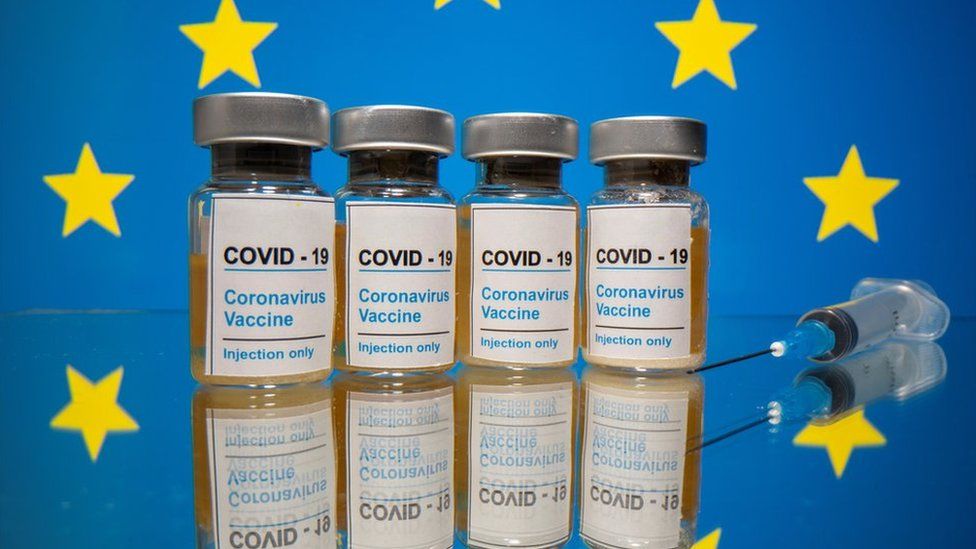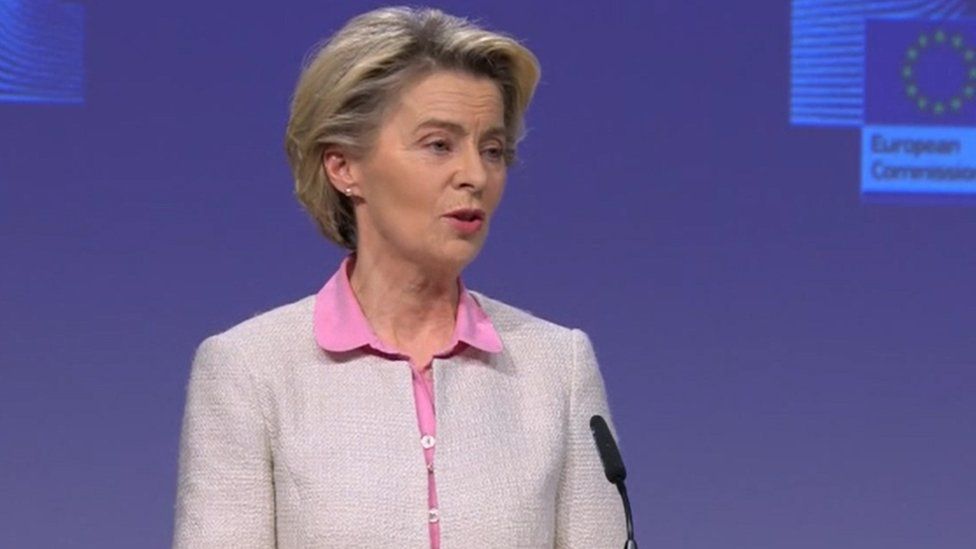The Covid vaccine being developed by Janssen, a subsidiary of Johnson & Johnson, is 66 per cent effective at preventing moderate and severe coronavirus, data published from phase three trials has shown.
The jab produced by world’s largest healthcare company is the first single-dose Covid vaccine so far.
Read more: Germany recommends blocking Astrazeneca vaccine for over-65s
Britain has pre-ordered 30m doses of the jab, though it has not yet been approved by the UK’s medicines regulatory board.
The efficacy rate is lower than those vaccines produced by Pfizer/Biontech, Moderna and Astrazeneca, which have already received approval. However, the data is not directly comparable because the Janssen trial excluded mild cases of the disease.
Investors appeared unenthused at the results, with J&J shares falling 3.9 per cent in pre-market trading in New York.
However, trial data from more than 44,000 participants showed the Janssen jab was 85 per cent effective at preventing severe Covid, and offered “complete protection” from hospitalisations and death after 28 days.
The vaccine also showed around 57 per cent protection against the new South African Covid mutation.
Alex Gorsky, J&J’s chief executive, said the results were a “critical milestone”, as the company prepares to file for emergency authorisation in the US as early as February — just two days’ time. If approved, the company will be able to ship vaccines immediately.
The company has vowed to offer the vaccine on a “non-profit” basis during the pandemic — as Astrazeneca has also done.
The UK is currently investigating whether providing the Janssen vaccine on a two-dose basis, as with other jabs, will increase its efficacy.
The news comes shortly after Novavax this morning announced its vaccine was 89 per cent effective in protecting against coronavirus.
Read more: EU says AstraZeneca contract contains ‘binding orders’ as vaccine row intensifies
The announcement came as a huge boost for the UK’s vaccine rollout, with Britain se two receive 60m doses.
So far, more than 7.4m people in the UK have received a first dose of a coronavirus vaccine. Prime Minister Boris Johnson has said he is “confident” ministers will achieve their target of offering the 14.9m most vulnerable members of the public their first injection by mid-February.
The post Breaking: Johnson & Johnson's single-dose Covid vaccine 66 per cent effective appeared first on CityAM.
https://www.msn.com/en-gb/money/other/breaking-johnson-and-johnsons-single-dose-covid-vaccine-66-per-cent-effective/ar-BB1dd7fM
- - - - - - - - -
Johnson & Johnson vaccine explained: Why its 66% Covid efficacy is a ‘game changer’ in pandemic fightDanielle Zoellner 31 January 2021
Johnson & Johnson released its clinical data on Friday, showing that its Covid-19 vaccine was 66 per cent effective against the novel virus and 85 per cent effective against severe disease.
The company said it would now apply for emergency use authorisation from the Food and Drug Administration (FDA), making it the third company to do so during the pandemic.
This vaccine was made in collaboration with J&J's Belgium-based vaccine division, Janssen Pharmaceutical, and Beth Israel Deaconess Medical Center. Instead of requiring two doses, like both Pfizer and Moderna’s coronavirus vaccine, it only takes one shot to obtain its immune response.
Pfizer, in comparison, proved to be 95 per cent effective at preventing symptomatic Covid-19, while Moderna was 94.1 per cent effective. This efficacy was reached following the second dose of each vaccine.
Although Johnson & Johnson’s global clinical trial shows a lower efficacy against the novel virus compared to the other two available in the US, experts are still calling the results a “game changer”.
What does Johnson & Johnson’s vaccine efficacy mean?
Clinical study data found the vaccine was 66 per cent effective against the virus overall. This efficacy increased to 72 per cent in the United States, but it was lower in South Africa, where a highly transmissible variant has taken over the country, with just 57 per cent efficacy.
People analysing this data could come away with the conclusion that they don’t want the vaccine because of the lower efficacy overall compared to other options available.
But Dr Anthony Fauci, the director of the National Institutes for Allergy and Infectious Disease, said a key indicator people should pay attention to from Johnson & Johnson’s vaccine was its impact on severe disease from Covid-19.
“The overall efficacy for severe disease was 85 per cent,” he said during a White House Covid press briefing on Friday. “There were essentially no hospitalisations or deaths in the vaccine group, whereas with the placebo group there were. We have a value-added vaccine candidate.”
Dr Fauci called the results “very encouraging”.
Immune response has also been shown to grow over time with vaccines, so the efficacy against Covid-19 after someone received the Johnson & Johnson vaccine could increase over a span of months.
Dr Michael Osterholm, an epidemiologist director of the Center for Infectious Disease Research and Policy at the University of Minnesota, reiterated this point when speaking to CNN on Friday about the new vaccine trial results
“If I were in the general public right now, my first reaction would be, I want the one that protects me the most. You know, we haven't really done a good job, I think, of explaining to the public that the immune response that occurs with the vaccine sometimes takes months to mature,” he told CNN.
Johnson & Johnson’s current clinical trial results “are really what happened in the two months after the last dose was administered,” he said.
The human phase of clinical trials for a vaccine normally lasts two years for scientists to determine the full efficacy of the treatment. This process has been sped up with the FDA providing emergency use authorisation to vaccine companies due to the severity of the pandemic.
“Actually if we had followed this several more months, it might have been an equal, if not superior vaccine to what we're seeing with Moderna and Pfizer,” Dr Osterholm said about Johnson & Johnson’s vaccine trial.
The company also has a separate trial currently looking at the efficacy of two doses versus its current one-dose shot. Depending on the results, it could be recommended later on for people to receive a second dose that would improve their response against the novel virus.
What are the added benefits of a Johnson & Johnson vaccine on the market?
The Johnson & Johnson vaccine only requires one shot versus the two doses required from other vaccine companies. This means that more people could be vaccinated quicker and with fewer doses.
“An efficacious one-dose, easy to transport vaccine is huge,” tweeted statistician Natalie Dean,
The vaccine also requires cold-storage requirements, making it easier for countries to access and handle the vials.
It can be stored in a refrigerator for up to three months at 36 degrees F to 46 degrees F, the company said in its press release. Pfizer, in comparison, requires a special deep freezer for its vaccine and dry ice when transporting.
Experts have said the cold-storage of the Johnson & Johnson vaccine would make it easier to send doses to developing countries compared to what Pfizer currently requires, given how much easier it is to transfer and store.
"In other words, we could bring the vaccine to the people," Dr William Schaffner, an infectious disease specialist, told CNN, "rather than bringing the people to the vaccine."
Vaccinating the United States was one thing. But the global pandemic would not likely end until the vast majority of the world achieved herd immunity, either naturally or through vaccinations. This was because of how the virus has mutated into other highly transmissible variants, including one first discovered in the United Kingdom and another from South Africa.
“Large outbreaks anywhere can give rise to variants that can escape vaccines everywhere,” Dr Ashish Jha, dean of Brown University’s School of Public Health, explained in a tweet.
If variants keep happening while many remain without access to a vaccine, a mutation could form that would work against the jabs that are currently developed. This would require scientists to then update their vaccines and give everyone who previously received a jab a new one or “booster”.
“It’s the nightmare scenario of a never-ending pandemic,” Dr Jha said.
Another benefit of Johnson & Johnson’s vaccine? The company has the manufacturing capacity to “create doses in the billions,” Dr Fauci said. “This has important potential and real implications domestically and globally."
Could someone receive a second dose of a different vaccine?
The question remains unknown as research continues to develop into the efficacy of the different vaccines.
The Centres for Disease Control and Prevention (CDC) recently stated that it would allow people to receive a second dose of a different vaccine in extreme circumstances – such as if they forgot which company gave them their first dose or they could no longer access a second dose from the original company. But this allowance only applied to Pfizer and Moderna, which are both mRNA vaccines.
Johnson & Johnson’s vaccine, in comparison, was slightly different in its approach to develop an immune response to the novel virus.
The company’s clinical trial looking into the efficacy of a second dose, though, could mean that someone who received one dose initially might later need to return for a second dose of that same vaccine. This would be if the clinical trials showed a stronger immune response to a two-dose method.
Many experts have reached the consensus, though, that the Johnson & Johnson vaccine at its current point was a good option for people if Pfizer or Moderna’s vaccine were not available.
“We're going to be learning a lot about these vaccines over the course of the next three to six months,” Dr Osterholm told CNN. “We'll have to keep sorting this out. Not sorting out to look at safety. Not sorting it to look at whether you should get it or not. Get it. But we're going to be constantly re-evaluating it. What's the best way to protect the most people over time? And that may be that you will be getting a booster dose on a routine basis with one or more vaccines. So I know it's confusing right now, but I think, get your first dose now. Protect as many people as possible.”
Dr Paul Offit, director of the Vaccine Education Center at Children's Hospital of Philadelphia, was in agreement that the public should want the vaccine if it were to receive emergency use authorisation.
“Were it me, were I not able to get the mRNA vaccine and I only had the choice of Johnson & Johnson vaccine, I would take it assuming that the data look good as we look at the FDA. I would take it in a second knowing there's probably a second-dose trial out there, which is likely to show it's even more effective,” he said.
The US federal government has purchased 100 million doses of Johnson & Johnsons vaccine. The company said it would fulfil all of those doses to the United States by June if it were to receive emergency use authorisation.
New variant ‘proving difficult to suppress’ as infections remain high
Single-dose Johnson & Johnson vaccine works against Covid, trial finds
Fauci warns variants are a ‘wake up call’
https://www.msn.com/en-gb/health/medical/johnson-and-johnson-vaccine-explained-why-its-66percent-covid-efficacy-is-a-game-changer-in-pandemic-fight/ar-BB1ddEAA?li=AAnZ9Ug









